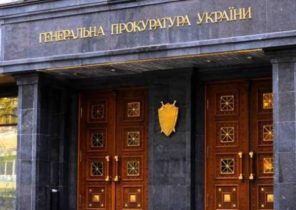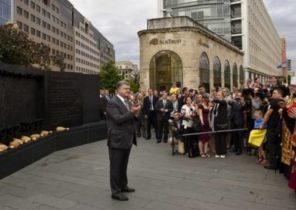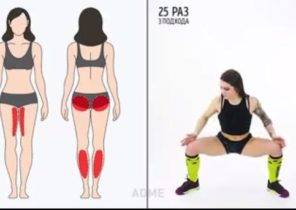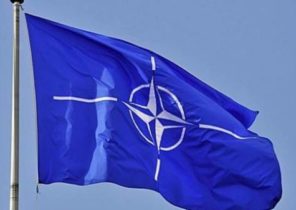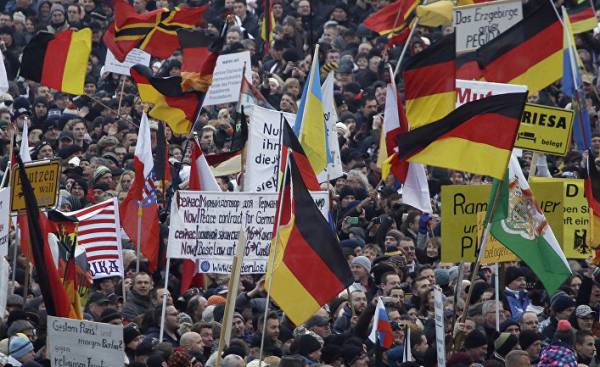
When Matthias Platzeck (Matthias Platzeck) is going to perform in Dresden, he was applauded even before the speech begins. One journalist, giving him the word, says that he is often present not as a person or at least as a politician from the SPD. Instead, it is presented as “understanding Russia Matthias Platzek”, giving it a special touch. However, according to her, in spite of this shade, the tickets to this public event “very, very quickly sold out”. 800 seats are all busy, the administration building even hastily organizes a stream in an adjacent room. They found a place the fifty guests who came spontaneously, without tickets.
So in the end came to 850 guests listen to the speech of Platzek, which is certainly and a human and a politician from the SPD, but also former Prime Minister of the Federal state, but not of Saxony. Why the interest?
The previous speaker said that he had asked his girlfriend why she wants to be sure to listen to Platzek. Her response was — verbatim: “Because he speaks my language.” Followed by loud, prolonged applause. And it became clear that Matthias Platzeck and the friend he met not not courses Aramaic in public school. It became clear that the speech will be about a completely different language space.
We are talking about perception of Russia. It is in Eastern Germany a special and more ambivalent than in the West. Russia, and here many see as avtomaticheski driven and geopolitically aggressive country. But this story here often competes with personal memories, with the desire for reconciliation, and partly with deep admiration.
This duality can also be measured. It starts in the political elite, the East German Prime Ministers who have consistently advocated the end of anti-Russian sanctions, and not only because Russia has great importance as an export market for East German firms. To Russia often, and also the lower levels of the party “the Left” to Pegida, the CDU and the SPD, especially a lot to ADH. In October last year in Leipzig was created by the civil initiative “good neighborly relations with Russia”, headed by the former head of the SPD faction in the land Parliament. And those who like to be somewhat hotter, in fact, every Monday to meet on the activities of Pegida, where for transparency we have once again a suggestion was made:”Merkel in Siberia, Putin in Berlin.” Position — from reconciliation to propaganda — not mixed, but in General they are significant and lend themselves to statistical measurement. So, the TV station MDR has presented the results of a survey in which among other the question was asked about who of international partners is trustworthy. Across Germany, Russia received as a partner, trustworthy, 21%, and in Saxony even 31%. The reason for this?
When Matthias Platzeck performed, and it was already some time ago, the audience constantly interrupted with applause. Platzeck said on the alleged “slavophobia” West and “cliche of the Russian despotism against Western civilization.” He says that some “triumphalist” making the West blind to the injury from which the former Soviet Union suffers from the moment of its decay. There remained bitter feelings, some of which are surfacing again 25 years later. It would have been nice to talk to. However: “We are asking less questions, often because we believe that you already know the answer”.
Meeting in Berlin with placecom, a few weeks after his speech. Matthias Platzeck said that notable in this duality is the fact that the West almost no one understands. “They say you’ve been 40 years in the occupation, and you have now more friends of Russia, how can it be?” Platzeck is the Chairman of the German-Russian forum, some call it not only understands Russia or her friend, but also a lobbyist. He believes the last name is humiliating, because he, according to him, no not a lobbyist. But he does not feel obligated to “criticize in Russia, all that is in it. In such criticism there is no shortage of, it is done from morning to evening, you just have to watch the TV program “Tagesschau” or open a newspaper”.
The deficit Platzeck sees that we need each other to understand. So he tries to explain that it is possible to create “other, namely, emotional approach to Russia with the help of biographical proximity, even if you yourself are critical”. To understand also means to distinguish between the Russophile feelings towards the people and the culture, on the one hand, and those moods, which Platzeck watches on their activities in the East, where “many the impression that Russia and Russian in the media and in politics are treated unfairly”. And on the other hand, between propaganda and partly fuelled by the Russian mass media behavior a considerable part of the supporters of Pegida. There, according to Platzek, it is more about Putin and about the “drawn to authoritarian persons. It’s kind of a cult leader.”
And it is in these noisy and therefore widely discussed in the circles occasionally obscure and unilateral fraternization, caused by a feeling of pressure on himself, some nasty Western-media-political-economic system. And if it is translated into the tone of messages on Facebook, you get something like this: “Hey, people, you and your employees, you don’t see your anti-Russian propaganda here. in the East, not falling on fertile ground?… channel MDR holds the same disgusting anti-Russian propaganda, like all public channels in Germany…then it is better to wallop Putin, sad, good people, I hope that the day will come and…you… fu…”.
Unknown addressee of all of these collected messages and letters is Stefan Rahway (Stefan Raue), the outgoing editor in chief of TV channel MDR. Rahway says on his channel every message, each documentation relating to Putin, cause a reaction particular size — both qualitatively and quantitatively. The main idea of the message: You want it all, too simplified, to make it easier.As editor-in-chief at Rahway there were many possibilities, not to simplify it for convenience. And this, again, implies the need to distinguish, to separate one from the other. For example, Rahway, on the one hand, he sees that his audience is important recognition of the fact that “Russia is not Putin and the former Communist party, Russia, this is also the people, traditions, Dostoevsky, Tchaikovsky. and so on. And that Russia in Germany are underrepresented, that’s too American.”
The complaint, whether directed against the TV channel MDR, whether directed against the system, most often comes from a sense of injustice. Rahway says that “many people believe unfair demonization of Putin and Russia similar to how unfairly evaluated in the media and in the society of their own past and the GDR in General.” This sense of injustice can be expressed even stronger and may become ultimately the fact that Stefan Rahway calls “negative perception of justice.” In the context of Russian themes, according to Rahway, the letters also frequently POPs up this item as a rejection of NATO. In the East of the country after the fall of the wall watched as within a few weeks the Warsaw Pact dissolved, as were humiliated Moscow. Today in discussions, according to Rahway, in the East sometimes appears and this position is:: “If it destroyed something, then it must be destroyed and more. Why is there still NATO? Why there is the Bundeswehr? Why are Americans still in Germany?”
It seems that the demonstrations and discussions emerge about the past, as if the attention shifts to the fact that the theologian and “understanding Eastern Germany,” Frank Richter (Frank Richter) identified for Dresden and dresdenas as the ellipse. Culture memories of this city is highly focused on the destruction during the second world war and the peaceful revolution of 1989. But what about what lies between these two events? Not worth attention, and if so, it is likely in such categories as rumors or recipes and personal “and remember, then.”
But times all the time are intertwined, it is only necessary to look closely at or have someone there who will help you with this. 38-year-old Yana Yanka (Jane Jannke) and have such a wonderful “someone.” You just sat down with her on the bench in the Dresden Alaunpark as she gives you to understand that he sees what you can’t see you. “To be here, in this place, for me, something special,” says Janke. Looking around, you will see a Playground and a couple of square meters that can be called a work of landscapers. But yanque sees more, she sees her past, “Here was formerly the Playground of the Soviet Army, I know the walls we fought with the children of officers or just went there to see what was going on”.
Child yanque living right on the military camp, and the memories of that time resurfaced with one day, seven years ago. Yanque is often passed on the way to Heide by the Soviet garrison cemetery, but never dared to look back. Seven years ago, “it was the same day as today, the beginning of summer”, yanque as if pulled there, for the gates of the cemetery. Ago she went out only a few hours later. In subsequent years, Janke has been documenting thousands of photos of graves in the abandoned cemetery. She was looking for the biography of the deceased and has successfully ensured that the cemetery is protected as a historical monument. Has long been one Association, which is also responsible for this cemetery and whose wonderful name — “Studio of memories”.
Janke says that he can not exactly explain why that spontaneous bold step was followed by such a deep interest. “I can only say that the me then something struck like human beings, then suddenly surfaced so many memories that I have suppressed: the children’s meeting with Soviet people, the stories my father brought home from work in the Soviet Union”. All this lay buried under the ruins of memory, not just her. “After the merger was so that all the talk about the time of the occupation matter how outdated, no one spoke about that time. It was taboo, it just wanted to forget.” Prolonged military presence of the Soviet Union, sometimes serious violations in the field of environmental protection — after the withdrawal of troops in 1992, all heaved a sigh of relief, says Janke. And quickly forgotten. Then because of this silence formed a “white spot in his own biography”, there was a feeling that “we missed a lot”.
Yana Yanka wants to have more discussions about the time of the occupation of her homeland. However, even with this name, many people have problems, even today. But if “I want to critically look at the past, it is necessary and its own role in the time to consider critically, and for many it seems impossible.” Others are deterred by a sense that discussions about Russia’s need to define their position, no matter what. “I don’t think it is right that we must always determine its position. But it reflects the spirit of our time: everything should happen quickly.”
To sort, to evaluate, to have a definite opinion — is the category of democracy. These questions, if you approach them a bit quieter, and looks to be otherwise. Then the question arose, could the biographical personal and cultural proximity, especially in East Germany, to prevent the possibility of losing any connection with Russia, especially given the harsh judgment on a political level. However, the hope is small even in yanque. Her personal touch was marred by the fact that she is critical of Kremlin policy. For example, where once there had been friendly contacts with people in Russia, with the beginning of the Ukrainian crisis, according to Janke, she immediately felt a “detachment, sometimes even hostility.” And here, says Janke, there is such a position, saying that if you’re not for us then you’re against us. “This view strongly reminds me of the time enterprises and it scares me”.
Times are intertwined, and it was here, in Dresden, it is felt almost everywhere. With places in the Park where Yana Yanka can for himself his own past as a film to impose on the present, close to the house in which I lived for five years that KGB officer Vladimir Putin, who now ruled in Moscow. In Dresden, you can book a tour of the places associated with him. Also quickly you can reach the Soviet garrison cemetery, the road leads past the officers ‘ school, where the cadets systematically marching through the yard where they are loaded into buses and then driven. Next door to the place, where the ground soldiers lie in military graves of the red Army. And times intertwined even at the graveyard. The one who only briefly looked back, he might not see the second part of the cemetery where the military, who died during the occupation.
Matthias Platzeck asks himself, who, indeed, will voluntarily and actively engage Russia when Gernot Erler (Gernot Erler) after the elections in autumn will leave his post of Commissioner of the government of Germany on cooperation with Russia: “After this will be harder”. Yana Yanka told me about the surprise with which her peers are listening about her interest in Russia and about the legacy of the Soviet Union, especially in Dresden.
Therefore the question is, who at various levels in the future will be to discuss or at least to define the legacy of this time and how long and deep will this legacy be remembered. This should be considered during a walk at the garrison cemetery June day. Weather here is doing its job. This can be seen on everything — on the graves, on a huge stone bearer, the obelisk. You look at it’s past and slowly go to the exit. The last thing you will see there at the door, will Board, the inscription on which probably. should be taken symbolically. It says: “Door closes automatically”.


